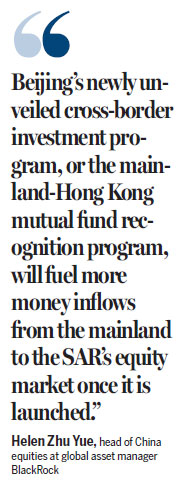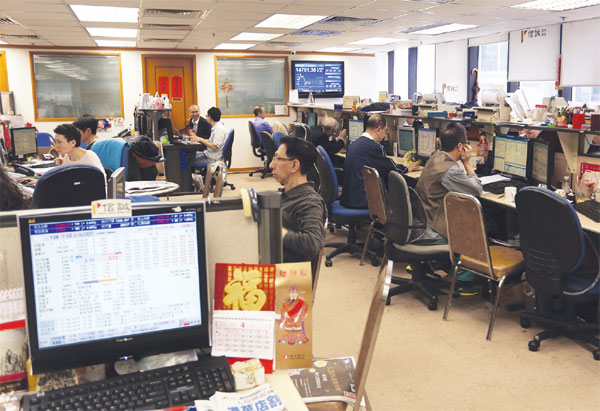HK equities tipped to outgun mainland peers
Updated: 2015-06-25 09:27
By Celia Chen in Hong Kong(HK Edition)
|
|||||||||
Hong Kong shares are expected to outperform their Chinese mainland peers in the coming months amid hopes of new cross-border capital flows, and the property and healthcare sectors are tipped to lead the gains, according to analysts at leading asset managers.
Beijing's newly unveiled cross-border investment program, or the mainland-Hong Kong mutual fund recognition program, will fuel more money inflows from the mainland to the SAR's equity market once it is launched, said Helen Zhu Yue, head of China equities at global asset manager BlackRock.
The imminent launch of the Shenzhen-Hong Kong Stock Connect through-train and the Qualified Domestic Individual Investor program, or QDII2, in six mainland cities will certainly bring a fresh flood of mainland capital to the Hong Kong market and is a big positive for local stocks, she added.
QDII2 is the second iteration of a program whose first version - QDII - was limited to institutional investors.
Apart from domestic inflows stimulating the Hong Kong market, the quantitative easing policy adopted by the European and Japanese central banks is also a big positive to spur capital inflows, said Ken Peng, investment strategist at Citi Private Bank Asia Pacific region.
And not only the strong capital inflows but the cheap valuation of Hong Kong shares will also contribute greatly to boosting the city's equity market.
Hong Kong stocks, especially those of small and medium-sized caps, are undervalued, particularly when compared with some soaring mainland shares, said Zhu.
The turnover of the city's shares will be driven higher with their cheap valuation and future abundant liquidity.
The price-to-earnings ratio of Hong Kong shares would likely reach 13 to 15 percent from the current 11 percent, said Zhu.
However, Zhu does not expect Hong Kong shares to rally as much as mainland stocks did in the last six months, as the city's performance is also closely related to the global environment.
As for the performance of mainland shares, Peng from Citibank dismissed fears of a bubble set to burst. He said there may be further correction in the mainland equity market but the decline will be within 20 percent.
However, BOCOM International Holdings Co Ltd warns that the mainland stock market is obviously in a giant bubble.
There will be high risk of the bubble bursting when the Shanghai Composite Index reaches as high as 6,100, a threshold the mainland equity market is theoretically capable of rising to, BOCOM said.
The coming six months will be decisive for investors keeping a wary eye on signs of a bubble on mainland stocks, as the Shanghai Composite Index has jumped as much as 48.15 percent this year. On June 5, it climbed above 5,000 points for the first time since the global slump of 2008.
On Wednesday, it closed up 2.48 percent at 4,690.15. That came as the Hang Seng Index, the Hong Kong stocks benchmark, added 0.26 percent to close at 27,404.97.
celia@chinadailyhk.com

|
Stockbrokers monitor changes in the share prices in a securities brokerage. Hong Kong's small and medium-sized caps are undervalued, particularly when compared with some soaring mainland shares, analysts say, and their cheaper valuation will interest more investors and capital inflow. But analysts have mixed feelings toward the stock-buying frenzy on the mainland. Some warn against the high risk of the bubble bursting, while some dismiss fears of a stock market collapse. Parker Zheng / China Daily |
(HK Edition 06/25/2015 page8)
